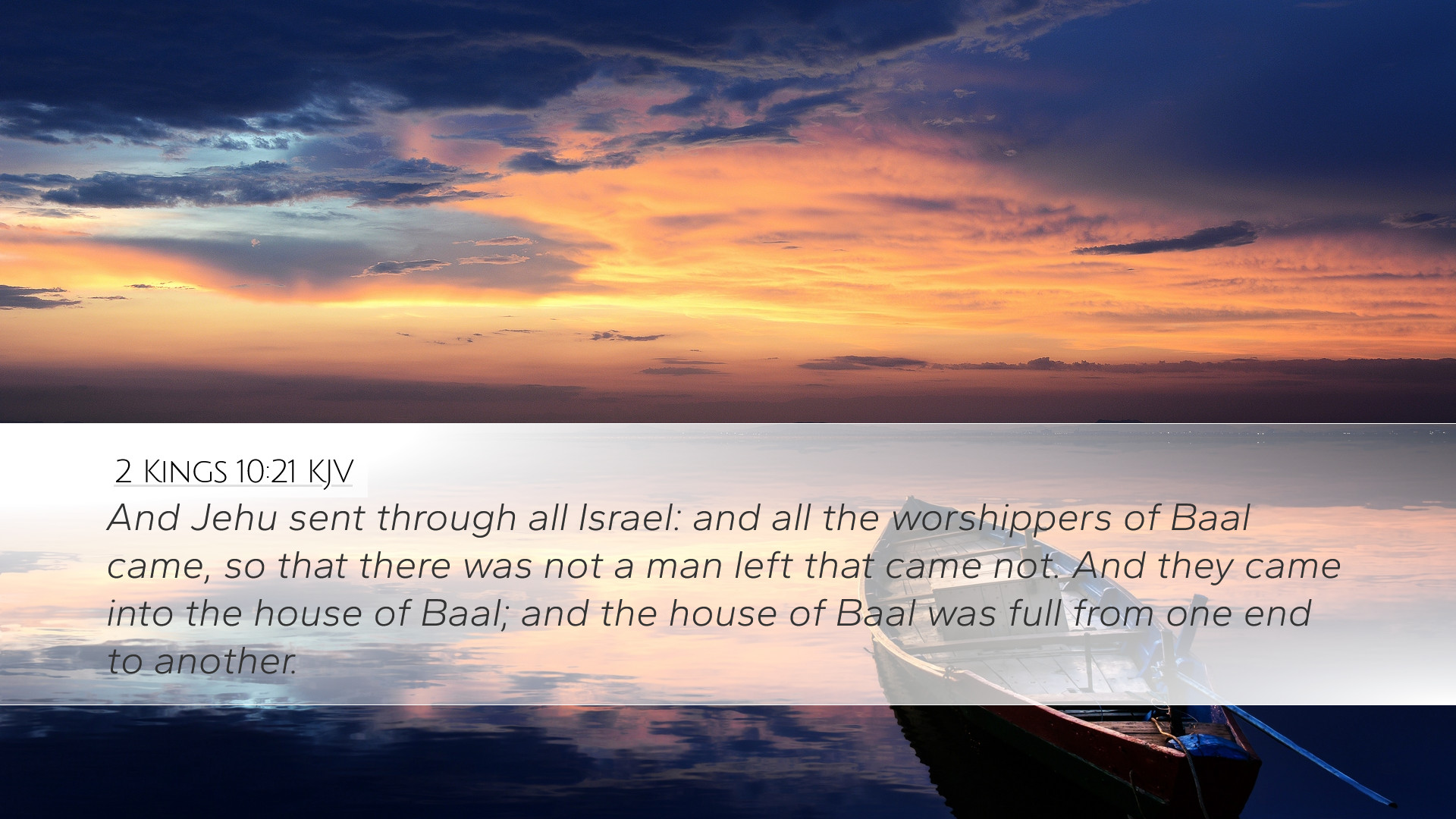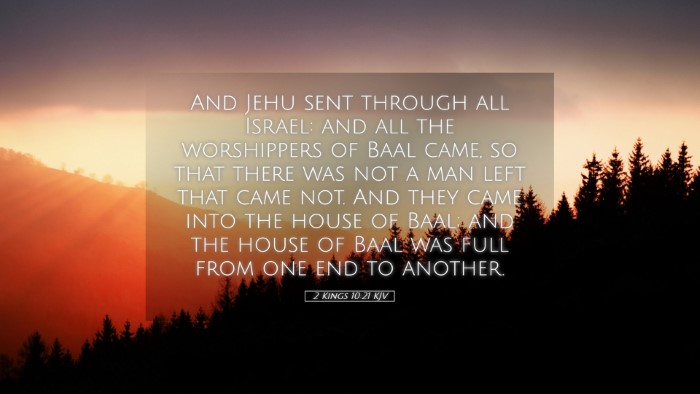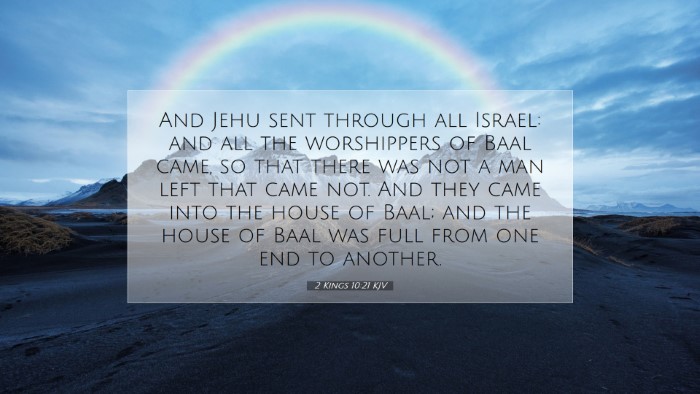Commentary on 2 Kings 10:21
2 Kings 10:21 states, "And Jehu sent throughout all Israel: and all the houses of Baal were filled with the worshippers of Baal, and the priests of Baal." This verse marks a pivotal moment in the narrative of Jehu's reign, as he seeks to eradicate the worship of Baal from Israel. It reflects both political and religious dimensions of his mission.
Contextual Background
The book of 2 Kings outlines the turbulent history of Israel's monarchy, emphasizing themes of faithfulness to God versus idolatry. Jehu, anointed king, was charged with the divine responsibility of removing the house of Ahab and its idolatrous practices. The context here is crucial as it delineates the expectations of leadership in Israel from a theological perspective.
The Role of Jehu
Jehu’s ascension to the throne was not just a political maneuver; it was an act instigated by divine providence as narrated by the prophet Elisha. Jehu is depicted as a zealous leader committed to fulfilling God’s judgment against the house of Ahab. Matthew Henry's commentary highlights that Jehu’s zeal for the Lord is both a blessing and a forewarning—it demonstrates dedication yet also warns of potential moral bankruptcy in fervor without righteousness.
Jehu’s Strategy
Jehu employs cunning strategy by gathering all worshippers of Baal under the guise of a great sacrifice, which draws a significant number of people, as suggested by Albert Barnes. This indicates his recognition of the influence Baal worship had on the nation and his intent to confront it head-on.
Worship of Baal
In understanding the implications of this verse, one must recognize the significance of Baal worship in Israelite society. Baal was a god of fertility, and the rituals associated with him were prominent in ancient Near Eastern culture. Adam Clarke notes that the worship of Baal represented a direct challenge to the worship of Yahweh, fostering a syncretistic culture that jeopardized Israel’s covenant with God.
Religious and Social Dynamics
The worship mentioned in this passage not only signals the religious state of Israel but also reveals the socio-political dynamics at play. High places for idol worship were often supported by the elite, indicating a complex interweaving of religion and power. When Jehu calls all to assemble in the temple of Baal, he exposes the underlying idolatry that had infiltrated the worship of Yahweh.
Implications for Leadership
Jehu's actions serve as a vivid reminder for contemporary leaders. His resolve to confront idolatry showcases the weight of accountability leaders possess in shaping religious practices. The implication for pastors and theologians today is significant; leaders must discern between cultural practices and true worship, ensuring fidelity to God's commands over societal pressures.
Cautions for Zealous Leadership
While zeal can be beneficial, it poses risks if not anchored in true righteousness. Both Matthew Henry and Adam Clarke caution against a form of zealotry that operates without a genuine relationship with God. Jehu’s actions, though divinely ordained, are marked by fanaticism that might overlook mercy and justice, important aspects of God's character.
The Gathering of Worshippers
The assembly of worshippers in this verse further drives home the importance of accountability within communal worship. Jehu’s initiative to gather all those who worship Baal suggests an act of purging—a sometimes painful yet necessary process in the pursuit of holiness. This aligns with the Old Testament’s consistent narrative on the call to holiness and separation from idolatrous practices.
Spiritual Accountability
Furthermore, the gathering illustrates the concept of communal responsibility in spiritual matters. As students and scholars of the Bible, it presents an opportunity to reflect on how congregations today engage with idolatrous practices that may not be as overt as Baal worship, yet remain prevalent. The critical question is whether such gatherings promote true worship or deepen compromise.
Theological Reflections
From a theological standpoint, 2 Kings 10:21 propounds the significance of confronting false idols. The text provokes deep introspection regarding what constitutes idolatry in modern society. Many scholars stress that idolatry is not limited to physical idols, but extends into modern equivalents such as materialism, power, and individualism which can divert worship from God.
Conclusion
In summary, 2 Kings 10:21 serves as a profound commentary on leadership, communal worship, and the ever-present challenge of idolatry. Jehu’s actions illustrate the complexities faced by those in positions of authority as they navigate divine mandates against societal norms. For contemporary application, it beckons a return to discernment in worship and a commitment to uphold God's holiness amidst cultural distractions. Through rigorous engagement with the text, scholars, pastors, and students alike are invited to deepen their understanding and practice of true worship that honors God.


